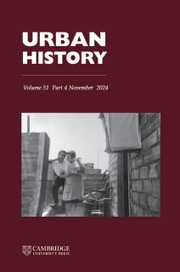Crossref Citations
This article has been cited by the following publications. This list is generated based on data provided by
Crossref.
2007.
Spaces of Colonialism.
p.
233.
McFARLANE, COLIN
2008.
Governing the Contaminated City: Infrastructure and Sanitation in Colonial and Post‐Colonial Bombay.
International Journal of Urban and Regional Research,
Vol. 32,
Issue. 2,
p.
415.
Legg, Stephen
2008.
Ambivalent Improvements: Biography, Biopolitics, and Colonial Delhi.
Environment and Planning A: Economy and Space,
Vol. 40,
Issue. 1,
p.
37.
Windover, Michael
2009.
Exchanging Looks: ‘Art Dekho’ Movie Theatres in Bombay.
Architectural History,
Vol. 52,
Issue. ,
p.
201.
URBAN, FLORIAN
2012.
Mumbai's suburban mass housing.
Urban History,
Vol. 39,
Issue. 1,
p.
128.
GLOVER, WILLIAM J.
2012.
The troubled passage from ‘village communities’ to planned new town developments in mid-twentieth-century South Asia.
Urban History,
Vol. 39,
Issue. 1,
p.
108.
Harris, Richard
and
Lewis, Robert
2013.
A happy confluence of planning and statistics: Bombay and Calcutta in the 1901 census.
Planning Perspectives,
Vol. 28,
Issue. 1,
p.
125.
Bhattacharyya, Debjani
2016.
Interwar Housing Speculation and Rent Profiteering in Colonial Calcutta.
Comparative Studies of South Asia, Africa and the Middle East,
Vol. 36,
Issue. 3,
p.
465.
2017.
Hydraulic City.
p.
265.
Weinstein, Liza
2017.
Insecurity as confinement: The entrenched politics of staying put in Delhi and Mumbai.
International Sociology,
Vol. 32,
Issue. 4,
p.
512.
Rao-Cavale, Karthik
2017.
Patrick Geddes in India: Anti-colonial nationalism and the historical time of ‘Cities in Evolution’.
Landscape and Urban Planning,
Vol. 166,
Issue. ,
p.
71.
Issar, Sukriti
2017.
Codes of Contention: Building Regulations in Colonial Bombay, 1870‐1912.
Journal of Historical Sociology,
Vol. 30,
Issue. 2,
p.
164.
Ranganathan, Malini
2018.
Rule by difference: Empire, liberalism, and the legacies of urban “improvement”.
Environment and Planning A: Economy and Space,
Vol. 50,
Issue. 7,
p.
1386.
Kamath, Lalitha
and
Dubey, Gopal
2020.
Commoning the Established Order of Property: Reclaiming Fishing Commons in Mumbai.
Urbanisation,
Vol. 5,
Issue. 2,
p.
85.
Tejani, Shabnum
2021.
Disputing ‘market value’: the Bombay Improvement Trust and the reshaping of a speculative land market in early twentieth-century Bombay.
Urban History,
Vol. 48,
Issue. 3,
p.
572.
Yates, Alexia
2021.
Real Estate and Global Urban History.
Kim, Youngjoon
Lee, Jinhyung
Kim, Junghwan
and
Nakajima, Naoto
2021.
The Disparity in Transit Travel Time between Koreans and Japanese in 1930s Colonial Seoul.
Findings,
van der Meulen, Geert J.M.
van Dorst, Machiel J.
and
Kuzniecow Bacchin, Taneha
2023.
Water sensitivity and context specificity – concept and context in Water-Sensitive Urban Design for secondary cities.
Urban Water Journal,
Vol. 20,
Issue. 1,
p.
15.
Das, Purbasha
2023.
‘Horn Please’: The evolution and regulation of traffic in twentieth-century India.
The Indian Economic & Social History Review,
Vol. 60,
Issue. 4,
p.
381.
van der Meulen, Geert J. M.
Mishra, Gargi
van Dorst, Machiel J.
Iyer, Mona
and
Bacchin, Taneha Kuzniecow
2023.
Reviewing Historic Urban Water Transitions to Advance Water-Sensitive Urban Design for Bhuj, India.
Land,
Vol. 12,
Issue. 10,
p.
1938.




